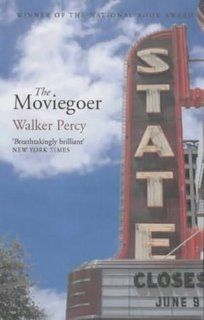 Before there were the existential musings of Walker Percy, there was Albert Camus. And, before I read The Moviegoer, I read the The Fall. I can't say for sure what it was that made me pick this one out of my pile of new books and read it on New Year's Day, but The Fall broke in 2007 with equal parts uncomfortable chortling and introspective repulsion. In more ways than one, perhaps it was an oddly appropriate book to kick off my new year.
Before there were the existential musings of Walker Percy, there was Albert Camus. And, before I read The Moviegoer, I read the The Fall. I can't say for sure what it was that made me pick this one out of my pile of new books and read it on New Year's Day, but The Fall broke in 2007 with equal parts uncomfortable chortling and introspective repulsion. In more ways than one, perhaps it was an oddly appropriate book to kick off my new year.I don't know, friends, if any of you have read this I would be curious to hear whether you found it as humorous as I. The Fall is a slim novel, the Vintage International edition I hold in my hand comes in at a scant 147 pages. The entire book is comprised of a series of monologues by Jean-Baptiste Clamence, a former Parisian who now resides in Amsterdam. Clamence delivers his orations--essentially his life story--to an unnamed fellow Frenchman who he befriends in an Amsterdam dive bar.
Clamence's story, in short, is about the downfall of a once proud and respected lawyer. The story amounts to something of a confession and by extension, some have suggested, an indictment of 20th century man. For example, when Clamence informs the stranger of how he failed to make any effort to save a woman who had lept from a Parisian bridge in a suicide attempt (to even so much as turn around when he hears her body hit the water), it undermines his contention that he is a steadfast protector of the weak. Through this tale and others, Clamence's virtue slowly unravels until we are left listening to a selfish, fairly detestible chatter box. Amusing, in light of the particulars of The Fall, to come across these words from Camus: "A guilty conscience needs to confess. A work of art is a confession."
Now, I mentioned I found the book humorous, but what I have described above surely doesn't sound the least bit comical. Well, it's not so much Clamence's story as it is the way he tells it that had me grinning with uneasy complicity. Camus presents a character whose flaws are our own, and though his relatively innocuous misdeeds may differ from the havoc we cause around us, I do not think it takes a great deal of effort to find a lot Clamence within ourselves. I could cite a plethora of examples where I felt as though the Frenchman were in my head, but I would rather not expose those portions of my brain that I keep private with lock and key in this most public of locales.
A curious question that returned to me throughout the book was whether the listener was really all that interested in Clamence's yammering. I suppose it is fair to deduce that he was, based on the fact that he met up with Clamence on several occasions over the course of a few days. More interesting perhaps is the idea that the listener is in fact the reader. The listener has no real personality of his own and so he naturally takes on the qualities of the reader, absorbing Clamence's words just as we do. What we find funny he finds funny, and where we are troubled by Clamence's tale he is troubled just the same. And, well, if I have said in one paragraph that we are Clamence and in the very next that we are the listener, maybe Camus had that type of reaction in mind.
